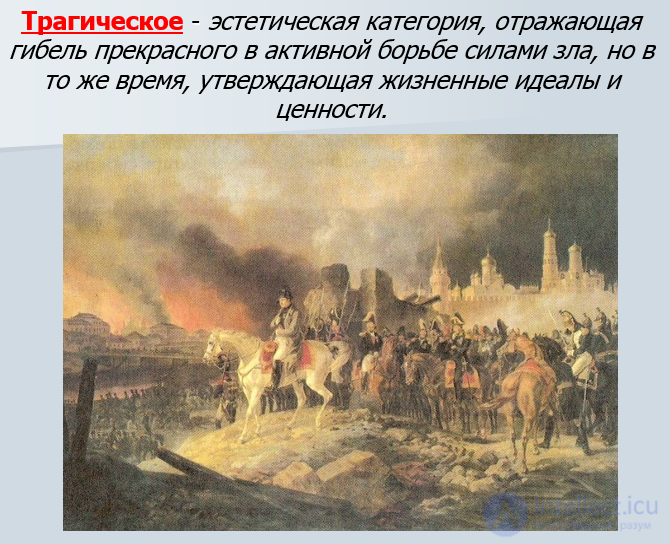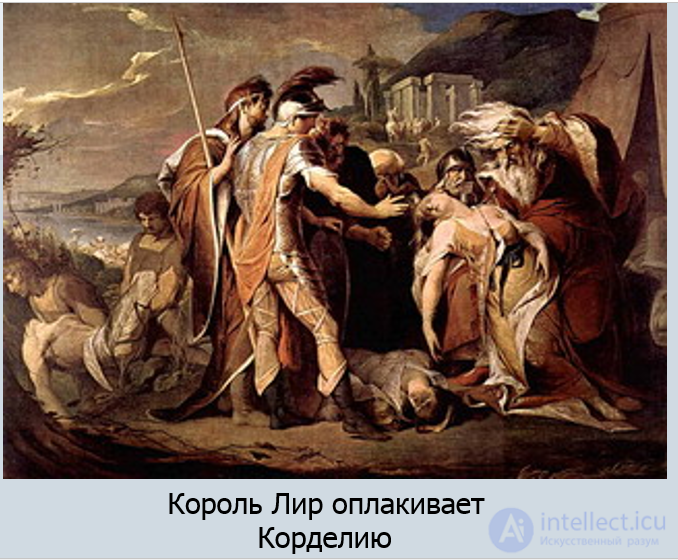Lecture
Tragic (from Greek tragikos - characteristic of tragedy) is an aesthetic category expressing the dialectic of freedom and necessity in the form of acute life contradictions (collisions) that can lead to the death of carriers morally justified, and consequently, a universally valuable goal Not all ordeal, not any experience which is acquired in hardships, provides tragic aesthetic certainty of such a measure, it acquires, provided that the requirement must be morally valuable content, that is, it contains the idea in In general, under this condition, the experience of mankind is enriched and improved, and the aesthetic attitude to the subject, with the image that this content is associated, is consolidated.
The uniqueness of the tragic as a type of relationship is that the ways and means of asserting a morally valuable person must find the complexity of the latter due to the fact that knowledge of the paths to good is not given by Apri Iori (a priori, this idea of goodness) On the path of personal fulfillment in forms of consistency his universal (the idea of humanity) a person enters the field of tragic contradictions. As it moves in a relationship not yet beaten track, the process of individualization of spiritual experience becomes dialectically contradictory: there is situation of non-compliance purposes and means of the objective need for you go beyond existing experience creates a spiritual tension situation, because the person has rebelled against the order of the world - the existing situation and the relations established ideas about values zhiznennotsіnnostі Zhittya.

The activity of the tragic personality unfolds as a dialectical unity of freedom and necessity, possibility and reality. The idea of necessity, concentrating in the world of the subject of volition and realizing as freedom of freedom, expands the boundaries of ideas about human capabilities to resist circumstances. If realizing it is necessary, a person does not always find adequate ways to assert his value. and comes to the realization of x inconsistencies and is able to take responsibility for involuntary guilt and not intentional crimes, he a is a heroic person whose fate is tragic. This is tragic, objectively conditioned by the emergence of the current state of relations beyond the limits of the current self-realization of a person. The universal value of her experience lies in activities that ultimately establish morality as the basis of human life.
The process of creating new content of experience through conflict acquires the character of necessity not only for the subject of activity, but also for the public whole, which acts as an antagonist of activity and threatening existing relationships. They are perceived as a guarantee of a certain stability, because for all their contradictions, the tragic personality that has opened in oneself the features of the universal (the experience of relationships acquired by the community and held by it), and then recognized as a reasonably necessary threat to them, creating This tragic personality, - the subject of activity, causes a special tension of the conflict.

Tragic is characterized by a situation where each side enters into conflict, has motives justified by the tragic hero, moving through contradictions, including because of conflict with himself (punishing myself for miscalculations in the way of creating experience and for involuntary mistakes and even crimes) , finally acquires, if not recognition, then public sympathy. Thus, the value of experience is affirmed, which revealed moral justification, and the value of an individual capable of working unknown ways, extending the experience of relationships The foregoing explains the meaning of the tragic, as tragic nature of circumstances, due to their dialectical in contradictory deployment doomed person to severe trials and even death. Throughout history, humanity moves through the tragic contradictions between the end and the means (the discrepancy between the actions and the image) in the process of creating a new level of spiritual experience. It is legitimate to talk about tragedy as a state of being of humanity. However, the real reason for the tragic, as was noted, is not a fatal condition character and personality. His aesthetic certainty is that this heroic character, the consistent manifestation of which leads the tragic fate of the personality. Will makes the realization of a morally justifiable goal go to meet fate, not retreating to the challenges or not of the environment. tragic personalities are carriers of big characters (Mr. Hegel), thanks to how they make historical progress of mankind. The transformation of the conflict to the irreconcilable It demonstrates the value of my way relationship, which is inspired by each of the parties to the conflict should be noted that the tragic conflict is an e stetichno valuable as a way of testing the relationship, and then - as a source of spiritual development chelovechestvovnogo entered lyudstva.

The laws of the formation of a new level of spiritual experience (through the tragic conflict) reflect the dialectical nature of its content as the unity of the universal (acquired and fixed by mankind) and special (the experience of the subjects of creativity), which opens up new horizons for the development of humanity The tragedy of the hero’s fate thanks to this, the experience of the public reinforces the knowledge of the content of its activities, creating spiritual links with it. Human communities associate themselves Lost through the images of their heroes.
The tragic as aesthetic integrity is revealed in the dramatic action. In it, the hero's activity unfolds as a process, explaining the aesthetic definiteness of the goal. The realization manifests personality traits such as will and character. They are prompted to seek truth in the difficult trials of life. The activity of creating relationships in the tragic contradictions of life is an archetypical image the aesthetic attitude of a person to the society, the creator of the perfection of which it appears. Personality is the real embodiment of everything god Attitudes of opportunities to assert the perfection of relations with the world, based on the morality of the marks.
In the dialectic of steady and variable, characteristic of tragic collision, the idea of orderliness of life as a process of its development on the path of improvement is implemented. In ancient Greek mythology, the idea of universal orderliness of life is determined on the basis of the concept of the fate of Moira, the goddess of fate, caring for the Universe, cares not only about the order of human life , but they even have power over the destinies of the gods because, for their lives, it creates dangers. The order of the world is the essence of the order that the gods must live, realizing the need to give life to others (people) and yielding, to a certain extent, their absolute freedom (the measure here is different between gods and people in mutual relations of gods and their laws are observed; gods create laws and control their observance. However, the feat of the titan, (in the myth) received forgiveness of Zeus, is evidence of the possibility of changes that guide relations to the new as an awn e modernism, titan's feat is considered useless. In “Parables of Prometheus.” F. Kafka, a way out of the aesthetic field of relationships is reflected as the destruction of the universality of connections and spessened life, in which the spiritual certainty (morality) of relationships is lost. Prometheus's feat, the writer, the forgotten all-eater, lost, forget all.
Awareness of the tragedy of human destiny in the world of destroyed moral ties determined the aesthetic way to overcome it in the culture of Christianity: in the form of a partial reduction of tragedy, the way home liberation of man from the "original sin" was taken by God (Son) and , atone for the sins of mankind, experienced suffering and death (followed by the Resurrection of the Resurrection).
So, a tragic conflict is aesthetically valuable as a way of approving relationships, and then as a source of the spiritual development of humanity. A tragic subject is a person distinguished by the necessity of approving relationships through testing in competition with a share.
The aesthetic characteristics of the tragic for the first time in the history of aesthetics comprehended by Aristotle based on the analysis of tragedy as a kind of spiritual experience, fixed in a particular aesthetically specific way - we tragedy is not alienated from the essential manifestations of the phenomenon of tragedy. and completed action, has a certain amount, reproduction is not a story, but an action, through compassion and fear helps to purify such feelings [1, p. 47] Philosopher emphasizes the principledness of the spiritual position of the actors of the tragedy, the value of which is determined by the bones of thinking and character. Happiness and unhappiness are in action, and the purpose of the tragedy is the actions of people, not their characters. The action and plot are defined as the basis of the tragedy. those. the idea, inspired by the heroes of the result, marks the aesthetic expressiveness of the tragedy as an aesthetic form: the artistic beauty of the expression, musical composition, theatrical design of the artistic design.
The important aesthetic characteristics of the tragedy include its ability to cause regret and horror , thanks to the tragic turn of events, Aristotle specifies the tragic features given his moral certainty. The philosopher explains why he should not be too good or too bad, because tragic then, who, not being distinguished by either virtue or justice, falls into misfortune not because of his insignificance and vileness, but through some mistake, whereas earlier he was greatly honored and happy [1, with 58 shchasti "[1, p. 58].
The main requirement for the characters in the tragedy is so that they are worthy The meaning of the concept decent character consists, according to Aristotle, firstly, in the inclination to something, secondly, in the fact that this propensity has to be worthy, then a worthy character. The central direction of the tragedy is the creation of condolences as a result of the unexpected course of terrible events as a result of a misunderstanding: the poet through artistic re-creation should give pleasure, despite feelings of sympathy and horror cathartic action of the tragedy (spiritual searching through singing, suffering) is due to the active experience of the tragic development of events and thanks to this the creation of experience in overcoming misunderstandings of life and redemption of unintentionally crimes. The culture of empathy in the form of the conscious value of the humanity of relationships is possible thanks to the aesthetically expressive action of Tragedivdyka naturally aesthetic and tragic.
The theory of the tragic in its categorical meaning and the aesthetic features of the tragedy as a genre of drama, meaningful to Aristotle, was later used as the basis for the unfolding or denial of certain provisions of the great Stagirit Recall that the value of compassion in Augustine expresses disapproval of stage art and questions the value of compassion to the heroes of the tragedy, although it does not deny its e of its influence on the viewer through fear and compassion. In aesthetics the enlighteners of the theory of the tragic pay particular attention attention, as in theater art they saw the school of moral education Voltaire in a number of articles devoted to the theory of tragedy and analysis of drama and theater, adheres to the idea of the cleansing effect of the tragic on the senses, which absorb a vivid picture of human passions Comparing ancient tragedy with the French era of classicism and the Enlightenment Voltaire notes the deepening of the subject of tragedies and bringing them closer to life: We have replaced the Greek legend with history. Politics, ambition, jealousy, art grow love [4, p. 106]. Other achievements of French drama, compared to ancient Greek, are also analyzed. Reflection of the increased level of drama and the diversity of events in the tragedy of the new time. In D Diderot's aesthetics, the idea of drama as a genre intermediate between tragedy and comedy, and defined the aesthetic features of the dramatic mytstka v. G. Lessing (Hamburg dramaturgy ) gives the rationale for the concept of tragic fear and compassion given their moral and cleansing influence on their morale no-ochisnogo vplivu.
In the article On the Sublime F. Schiller considers the peculiarities of the morally exalted character, behind his traits the most akin to the tragic. The philosopher emphasizes that the propensity for morality is not only in the rationalistic nature of man, can be developed not only with the help of reason, but also possible thanks to the sensible-sensible (human) aesthetic ability, which "may be excited by certain subjects and, through the purification of human senses, acquire the ability for an ideal eta souls [25, p. 228] Sublime - a sphere where noble characters operate that have a beneficial effect on the morality of l. Judah. In the work On the tragic art the subject of the analysis are the subjective prerequisites of the tragic conflict. The philosopher sees them in a reasonable (moral) conflict. and the sensual nature of man. He belongs to the formulation of the three main bases of tragic emotions (i.e. the ability to empathize). First, the subject of our compassion must be related to us, and the action that brings sympathy must be Secondly, the suffering, its source and level must be notified to us in the form of interrelated events. Thirdly, the suffering must be sensually reproduced - directly represented in the action eyes. All these qualities are combined in the tragedy [24, p 58 . All the tacos are looking forward to the tragedy [24, p. 58].
Dialectic understanding of the essence of the tragic German classical aesthetics of F. Schelling in Philosophy of Art , analyzing the basic ideas Poetics of Aristotle, talks about the objective grounds of the tragic, that is, the circumstances that predetermine the unfolding of the conflict precisely in the tragic Misfortune of external character, "the philosopher notes, they do not create a truly tragic contradiction. After all, a face must be above external misfortune, otherwise it is worthy of contempt. A face can also not be perceived, barriers are purely physical by these efforts, as tragic, hence the essence of the tragedy in the present struggle of freedom in the subject and the necessity of the objective (italics auth - VM) [21, from the 400th active (italics auth. V.M.) [21, p. 400].
No less important condition of the tragic is the need for the tragic guilt of the person, was not the result of error, and revealing the will of rock or revenge of the gods is the struggle of freedom with the need really takes place where the need overcomes the will and freedom is won in its realm. This sphere is the freedom of the spirit The supreme opinion of the Greek tragedy and the victory of freedom above is to voluntarily bear Pocar Ann for the inevitable crime (the will of the year - In M), in order to prove the loss of his own freedom that freedom and perish, manifesting one’s free will [21, p. 403] This feature of the Greek tragedy determines its harmonious character, leaving people not exposed, but healed and purified, as Aristotle F. Schelling expressed, manifestation in the tragic dialectic of freedom and of necessity - their all-encompassing wickedness: Freedom as an exceptionally special (freedom of the spirit of the individual - M) cannot be permanent; such constancy is possible only to the extent that it presents itself in universality and, having risen so higher consequences of guilt, enters into an alliance with necessity, and since it cannot avoid the inevitable, then it voluntarily subordinates itself to its actions. "Only this should be considered a truly tragic element in the Tragedy tragic element of the tragedy.
The moral basis of the tragic is the nobility of characters . They define the moral character of the tragedy, based on the highest level of morality.
The Greek tragedy claimed freedom as the highest value, manifested in the hero’s voluntary punishment of himself for crimes not consciously and deliberately committed by him, but determined for him by fate, the fate of Konstatuuyuchy this feature of the Greek tragedy, Schelling argues that the hero must resist the year, otherwise
Comments
To leave a comment
Aesthetics
Terms: Aesthetics